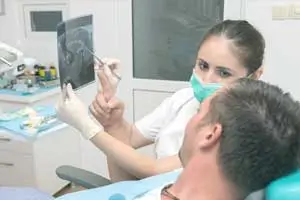Schedule a Gum Disease Consultation
Serving Patients in Vancouver WA

“Gum disease” is also known as periodontal disease and understanding this disease means understanding the complex relationship between your teeth and your gums. Your gums (the pink area above your teeth) are known as the gingiva. The gingiva is the support structure for your teeth. Within your gums is the socket for your teeth. The roots of your teeth are embedded in the socket and are anchored by periodontal ligaments. Between your teeth and your gums is a V-shaped gap called the sulcus.
What Causes Periodontal Disease?
When your teeth are coated in bacteria and not cleaned, this can create an infection. The cause of this infection is plaque. Plaque is a bacterial film that is on your teeth left by the food you eat and the liquids you drink. When you brush your teeth, this plaque is removed, which is why it’s important to brush after every meal.
If plaque or tartar is left on your teeth, the gums begin to pull away from the tooth. This separation invites even more infection and bacteria to the tissue. The result is gum disease. If infections are only infecting the gums and not below, it’s referred to as gingivitis. As the infection worsens it spreads. When it spreads, it can also infect the connecting tissue and the bones. This spread of infection to underlying tissue and bone is called periodontitis.
When left untreated, periodontitis can cause complications that can affect not only your teeth and gums, but can lead to bone loss in the jaw, and can spread further into the body from there. Periodontitis is typically painless, so you won’t notice it.
CURIOUS ABOUT YOUR NEXT STEPS?
Click the button below to leave your name and number and we’ll call you back.Warning Signs of Gum Disease
Even though you don’t feel pain, there are signs that you will notice that could indicate gum disease. Your gums may bleed easily when you brush your teeth or eat. Your gums may be red, swollen, or very tender to the touch. You could have persistent bad breath or you may have a bad taste in your mouth that you can’t identify. If the gum disease has advanced further, you may even notice that your teeth have pulled away from your gums or that you feel your teeth are loose or shifting around in their place. If you have partial dentures, you may notice that the partials no longer feel comfortable or don’t fit correctly.
Factors That Can Cause Gum Disease
Gum disease is caused by any number of factors, including:
- Smoking
- Pregnancy
- Diabetes
- Certain prescription drugs
- Long illnesses
If you notice any of these symptoms, it is best to see your dentist sooner rather than later. When caught early, gum disease is easily treated with a minimum of damage or discomfort. If gum disease is allowed to progress, there is a point of no return, where the disease will only be able to be prevented–not cured.
Gingivitis
The symptoms of gingivitis are red, swollen gums that easily bleed. If you have gingivitis, you are in the early stage of gum disease, and you’re likely to reverse it. Getting treatment at this stage means that you will avoid the more serious consequences of gum disease. A professional cleaning and strict attention by to you brushing and flossing can reverse this early warning sign.
Periodontitis
If you ignore the early warning signs of gingivitis and wait until you have full-blown periodontitis, you have now reached the advanced stages of gum disease. If you don’t get the disease treated at this point, you risk bone and tissue loss which only gets worse over time. Your teeth could start to deteriorate, decay, fracture, or even fall out.
Advanced, or aggressive periodontal disease, is extremely destructive. Though you may appear healthy, your teeth and gums and their underlying structures are not. You may rapidly lose tissue and bone, causing your teeth to be very unstable.
As this disease advances and your teeth shift or fall out, your appearance may also change. Bone loss within your jaw can cause your face to sink in, and you may appear older than your years. The ultimate end result is that you will most certainly lose some, if not all your teeth, depending on how far the disease has progressed.
Preventing Periodontal Disease
Periodontal disease is one you can easily prevent. Daily oral hygiene is the most crucial part of prevention, but having regularly scheduled dental cleanings is important as well. Your dentist may recommend that you have periodic periodontal exams as well, particularly if you are an at-risk patient, such as a smoker or diabetic. If you do have periodontal disease, your dentist can create a treatment plan for you that will help arrest the disease, typically involving root planing and scaling. If you’re concerned about periodontal disease, contact Lewis Family & Implant Dentistry today for a consultation.
Back to General Dentistry